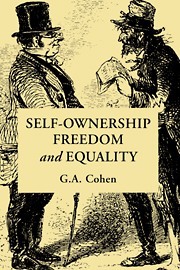Book contents
- Frontmatter
- Contents
- Preface
- Acknowledgements
- Introduction: history, ethics and Marxism
- 1 Robert Nozick and Wilt Chamberlain: how patterns preserve liberty
- 2 Justice, freedom, and market transactions
- 3 Self-ownership, world-ownership, and equality
- 4 Are freedom and equality compatible?
- 5 Self-ownership, communism, and equality: against the Marxist technological fix
- 6 Marxism and contemporary political philosophy, or: why Nozick exercises some Marxists more than he does any egalitarian liberals
- 7 Marx and Locke on land and labour
- 8 Exploitation in Marx: what makes it unjust?
- 9 Self-ownership: delineating the concept
- 10 Self-ownership: assessing the thesis
- 11 The future of a disillusion
- Bibliography
- Index of names
- Subject index
7 - Marx and Locke on land and labour
Published online by Cambridge University Press: 29 August 2009
- Frontmatter
- Contents
- Preface
- Acknowledgements
- Introduction: history, ethics and Marxism
- 1 Robert Nozick and Wilt Chamberlain: how patterns preserve liberty
- 2 Justice, freedom, and market transactions
- 3 Self-ownership, world-ownership, and equality
- 4 Are freedom and equality compatible?
- 5 Self-ownership, communism, and equality: against the Marxist technological fix
- 6 Marxism and contemporary political philosophy, or: why Nozick exercises some Marxists more than he does any egalitarian liberals
- 7 Marx and Locke on land and labour
- 8 Exploitation in Marx: what makes it unjust?
- 9 Self-ownership: delineating the concept
- 10 Self-ownership: assessing the thesis
- 11 The future of a disillusion
- Bibliography
- Index of names
- Subject index
Summary
… labour makes the far greatest part of the value of things we enjoy in this world. And the ground which produces the materials is scarce to be reckoned in as any, or at most but a very small, part of it …
(John Locke, Second Treatise of Government)1. We have seen that the axial distinction between self-ownership and world-ownership generates three views about the powers of nature and the powers of people. The views differ according as they do or do not encourage an egalitarian approach to the substances and capacities of nature on the one hand, and to the powers of people to modify nature on the other.
There are, first, those who defend an egalitarian approach to both natural resources and human labour. They argue that talented people are merely lucky to be so, and that, to counter the unjustly unequalizing influence of that luck, not only what nature produces but also the product of the powers of people should be distributed according to principles of equality (of, perhaps, in the two cases, appropriately different kinds). John Rawls and Ronald Dworkin are leading exponents of this position.
Others, however, such as Robert Nozick, oppose egalitarianism with respect to both human and non-human productive capacity.
- Type
- Chapter
- Information
- Self-Ownership, Freedom, and Equality , pp. 165 - 194Publisher: Cambridge University PressPrint publication year: 1995
- 1
- Cited by

